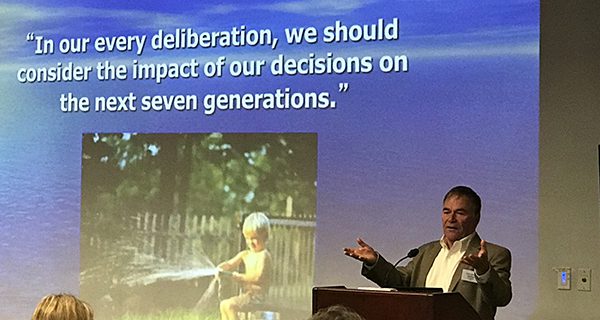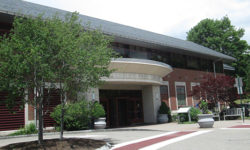[ccfic caption-text format="plaintext"]
By Lisa Moore
Hometown Weekly Correspondent
Nearly 150 Wellesley residents attended the Landscapes for Living: A Forum on Eco-Friendly Gardening and Lawn Care held at the Wellesley Free Library. Co-sponsored by Wellesley Natural Resources Commission, Sustainable Wellesley, Health Department, Recreation Department, Department of Public Works, and Wellesley Free Library, the forum offered several how-to workshops including “Attracting Honey Bees and Pollinators to Your Garden,” “Edible Landscapes,” and “Easy Composting for a Pesticide-Free Garden, Lawn and Landscape.”
The highlight of the event was the appearance of two guest speakers. Dr. Doug Tallamy, a nationally-known speaker and advocate for incorporating native plants in home landscaping, gave a talk about “Creating Living Landscapes.” Tallamy’s presentation focused on creating diverse ecosystem in one’s garden to sustain life. Chip Osborne, meanwhile, presented “Help, I Don’t Know What’s in My Lawn,” a talk about green ways of achieving a green lawn.
The event launched the Wellesley Natural Resources Commission’s Grow Green Wellesley Campaign, the mission of which is to inspire Wellesley residents to maintain home lawn and gardens without the use of pesticides.
There is growing evidence of the dangers of pesticides and toxic chemicals used on home gardens and lawns can be successfully eliminated, all while achieving lush green lawns and beautiful gardens using chemical-free organic lawn and garden care methods. The proof of that statement can be easily seen by visiting any of Wellesley’s town-maintained fields and grounds, which are all managed without the use of pesticides. The town hopes to lead by example and show residents that their lawns can be green and lush like the numerous soccer fields and green spaces in town.
The big theme of the day was about changing the way people think about lawn and garden care. Chip Osborne talked about how with a greater understanding of soil biology, and lawn and garden ecology, the focus of lawn care has shifted. Whereas lawn care once revolved around nitrogen, phosphorous, and potassium levels in soil, it is now moving towards maintaining colonies of bacteria, fungi, nematodes and protozoa, and the key nutrients those organisms need to survive. Osborne shared tips for using natural products like brewer’s yeast, kelp, and carbon from biochar to add micronutrients that support the organisms that make up the soil ecosystem, creating the healthy environment required to grow a lush, green lawn.
He also mentioned the importance of planting the right lawn for the right location, discussing the pros and cons of several species of grass based on factors including level of sun/shade and moisture conditions.
In addition to the forum as part of the Grow Green Wellesley Campaign, the NRC has a tree-planting program, aimed at replacing shade trees, along sidewalk paths. They have been planting free trees for residents that applied to the program in the spring and will continue to offer trees in the fall.
For more information on organic lawn and garden care or the tree-planting program, visit Wellesleyma.gov/NRC.
























